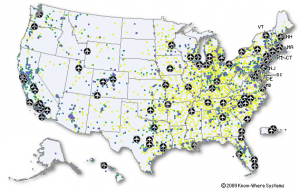Choosing a company location is perhaps the most significant choice a company owner or startup is likely to make, therefore it demands precise planning and research. It requires considering demographics, assessing your supply chain, scoping the levels of competition, keeping on budget, comprehending state regulations as well as taxes, plus much more. In particular, if you’re looking for small business grants for women, your location can signal to potential backers the seriousness and level of detail you have invested planning your enterprise.
Here are some tips that may help you choose the right small business location.
Understand Your Business Needs
 Many businesses choose a location that provides exposure to clients. In addition, generally there are less obvious elements and requirements to consider, as an example:
Many businesses choose a location that provides exposure to clients. In addition, generally there are less obvious elements and requirements to consider, as an example:
- Brand Image – Is the particular site consistent with the image you would like to sustain?
- Competition – Are the actual businesses around you contributory or perhaps competitive?
Local Job Market place – Will the location have potential workers? What is going to their commute end up being like? - Take into account Long term Expansion – Should you foresee further expansion, look for a building which offers extra space should you need it.
- Proximity to Vendors – They should be in a position to find you effortlessly as well.
- Basic safety – Evaluate the crime rate. Will staff really feel safe alone inside the building as well as travelling to their automobiles?
- Zoning Restrictions – These determine whether it is possible to carryout your form of business inside particular buildings or areas. You can find out precisely how property is zoned through contacting your local planning agency.
Assess Your Financial circumstances
Aside from deciding what you can afford, you will need to be familiar with other financial issues to consider:
- Hidden Fees – Almost no places are generally business ready. Include costs like renovation, decorating, IT system enhancements, and so on.
- Taxes – Precisely what are generally the actual income and sales tax rates for your state? What about property taxes? Can you shell out much less in taxes by locating the business over a nearby state line?
- Minimum Wage – While the federal minimum wage is $7.25 for every hour, many states have a larger minimum. View the Department of Labor’s listing of minimum wage rates by state.
- Government Economic Incentives – Your small business location may determine whether you qualify for government financial business programs, such as state-specific small enterprise loans and other financial benefits.
Is the Location Enterprise Friendly?
Knowing legal guidelines enforced upon enterprises around a certain area is essential. As you search to grow your business, it can be beneficial to cooperate with a small venture expert or counselor.
Check what programs and support your state administration and local community provide to help small firms. Many states supply online resources to help small business owners start-up and succeed.
Local neighborhood sources for instance SBA Offices, Small Business Development Centers, Women’s Business Centers, as well as other government-funded programs particularly assist small business owners.
The Bottom Line
Perform the analysis. Speak with other business people and possible co-tenants. Seek advice from the small business community and utilize available resources, such as free government-provided market information, to assist in your time and efforts.